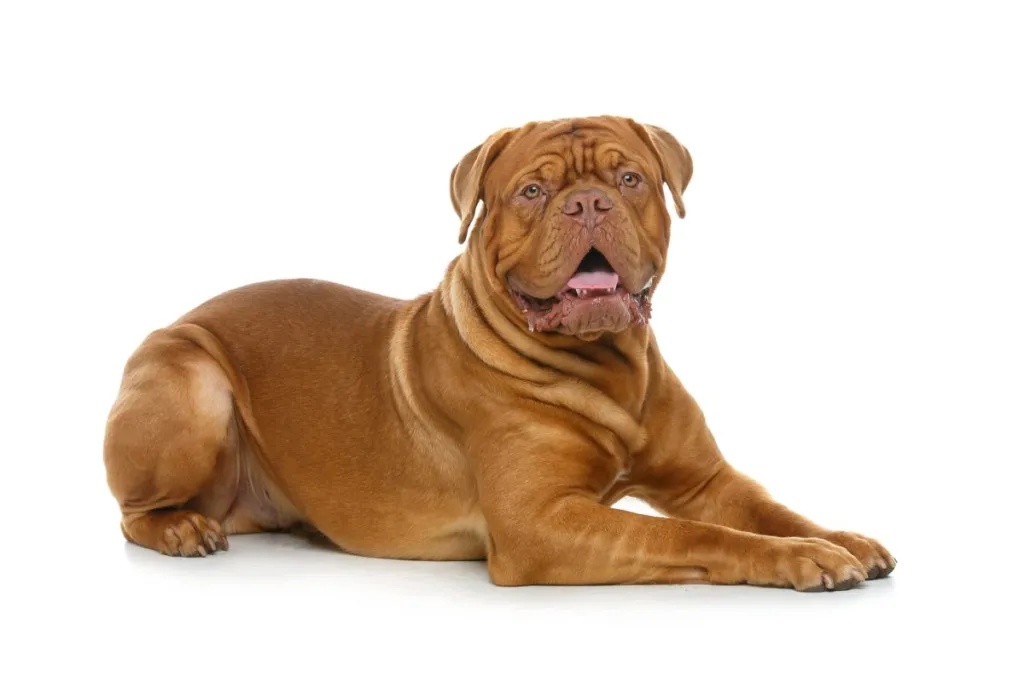Welcome to our comprehensive guide on the Dogue de Bordeaux, a breed as majestic as it is loyal. Whether you’re fascinated by their imposing presence or considering welcoming one into your family, this expert exploration will cover everything from their rich history and distinctive characteristics to their care needs, training tips, and health considerations. Join us as we delve into the world of the Dogue de Bordeaux!
Origins and History
French Roots
The Dogue de Bordeaux, also known as the French Mastiff, traces its origins to France, where it has a history dating back centuries. Believed to have descended from ancient mastiff-type dogs used for hunting and guarding, the Dogue de Bordeaux was primarily employed in roles such as guarding estates, hunting wild boar, and even participating in bull-baiting and dog fighting.
Development of the Breed
Over time, the Dogue de Bordeaux evolved into a versatile working dog known for its strength, courage, and loyalty. Despite periods of decline due to wars and changes in societal attitudes towards dog fighting, dedicated breed enthusiasts preserved and standardized the breed’s traits. Today, the Dogue de Bordeaux enjoys popularity as a devoted family companion and capable guardian.
Physical Characteristics
Impressive Build
Dogue de Bordeaux dogs are large and muscular, with a powerful build that commands attention. They typically weigh between 110 to 140 pounds and stand around 23 to 27 inches tall at the shoulder. Their broad head, muscular neck, and deep chest contribute to their imposing appearance.
Coat and Colors
One of the breed’s distinguishing features is its short and smooth coat, which comes in shades of fawn ranging from light to dark, often with a distinctive mask on the face. Minimal grooming is required to maintain their coat, making them relatively low-maintenance in this regard.
Temperament and Behavior
Gentle Giants
Despite their formidable size and history as guardians, Dogue de Bordeaux dogs are known for their gentle and affectionate nature with their families. They are loyal, devoted, and protective, making them excellent watchdogs and companions. Early socialization is essential to ensure they are well-mannered around strangers and other pets.
Training Insights
Dogue de Bordeaux dogs are intelligent but can also be stubborn, requiring firm and consistent training methods. Positive reinforcement techniques that reward good behavior with treats and praise work best, as they respond well to gentle guidance and encouragement. Patience and understanding their protective instincts are key to successful training.
Health and Wellness
Common Health Issues
Like all large breeds, Dogue de Bordeaux dogs may be prone to certain health conditions, including:
- Hip Dysplasia: A genetic condition where the hip joint doesn’t fit properly, leading to discomfort and mobility issues.
- Heart Conditions: Such as dilated cardiomyopathy (DCM), which affects the heart muscle’s ability to pump blood effectively.
- Joint Problems: Including elbow dysplasia and arthritis, especially in older dogs.
Regular veterinary check-ups, a balanced diet, and appropriate exercise are crucial for maintaining their overall health and well-being.
Nutritional Needs
Feeding a Dogue de Bordeaux should be tailored to their size, age, and activity level. High-quality dog food that supports their joint health and provides essential nutrients is recommended. Avoid overfeeding and monitor their weight to prevent obesity, which can exacerbate joint issues.
Care and Grooming
Exercise Requirements
Despite their large size, Dogue de Bordeaux dogs have moderate exercise needs. Daily walks, playtime, and mental stimulation such as puzzle toys or obedience training sessions help keep them physically fit and mentally engaged. They enjoy spending time with their families and participating in activities that strengthen their bond.
Grooming Tips
Maintaining a Dogue de Bordeaux’s coat is relatively simple due to its short length and smooth texture. Weekly brushing with a soft-bristled brush helps remove loose hair and minimize shedding. Regular dental care, nail trimming, and ear cleaning should also be part of their grooming routine to prevent infections and maintain overall hygiene.
Living with a Dogue de Bordeaux
Family Compatibility
Dogue de Bordeaux dogs are affectionate and protective companions that thrive in homes where they are considered part of the family. They are good with children when properly socialized and supervised, although their size and strength should be taken into account. They are loyal and devoted to their families, making them excellent guardians and loving pets.
Environment Considerations
Due to their size and protective nature, Dogue de Bordeaux dogs are well-suited to homes with ample space both indoors and outdoors. They are adaptable to various living situations, including apartments, as long as their exercise needs are met. Secure fencing is recommended to prevent wandering, as they may feel compelled to protect their territory.
Conclusion
The Dogue de Bordeaux is a magnificent breed with a rich history and a gentle heart that endears them to their families. Whether you’re attracted to their imposing presence, loyalty, or affectionate nature, owning a Dogue de Bordeaux is a rewarding experience. Remember, responsible ownership includes providing proper care, training, and veterinary attention to ensure a fulfilling life for your Dogue de Bordeaux companion.
- Best Lusha Alternatives for 2025 - April 19, 2025
- Best Overloop Alternatives for 2025 - April 19, 2025
- Best Snov.io Alternatives for 2025 - April 18, 2025



